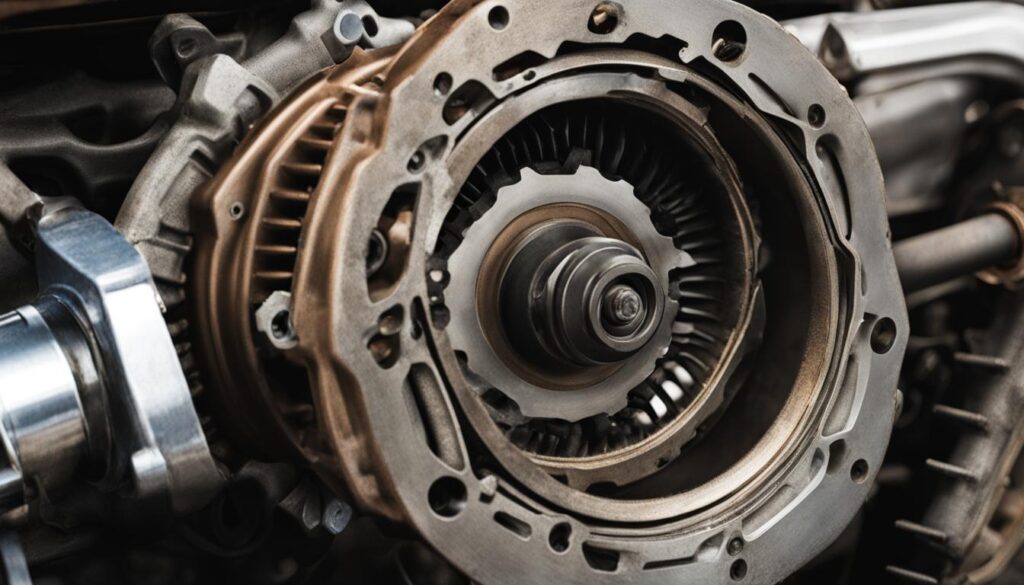If you’re experiencing issues with your car’s AC system, it could be a sign that the AC compressor is failing. Common symptoms of a bad AC compressor include odd sounds coming from the unit, hot air blowing from the vents, fluid leaks, a stuck clutch, tripping circuit breakers, and broken suction lines. If you notice any of these signs, it’s important to have your AC compressor checked and repaired as soon as possible to avoid further damage to the system.
Key Takeaways
- Odd sounds coming from the AC unit can indicate a failing compressor.
- An AC system blowing hot air instead of cold air may have a faulty compressor.
- Fluid leaks, particularly refrigerant leaks, are a sign of a failing AC compressor.
- If the clutch of the AC compressor is stuck, it may need to be replaced.
- Tripping circuit breakers can be caused by a faulty AC compressor.
Odd Sounds
One of the most common signs of a failing AC compressor is the presence of odd, clunky noises coming from the unit. These noises can indicate that the compressor is about to give out completely. If you notice any strange sounds coming from your AC system, it’s important to have it inspected and repaired by a professional.
When the AC compressor starts making strange noises, it’s a clear sign that something is wrong with the unit. These odd sounds can range from rattling and clicking to grinding and squealing. The specific noise you hear may vary depending on the specific issue with the compressor, but any abnormal sound should be cause for concern.
One possible explanation for odd sounds is a fault in the compressor’s internal components. Over time, wear and tear can cause parts such as bearings, pistons, and valves to become damaged or worn out. These damaged components can produce the clunky noises you hear, indicating that the compressor’s functionality is compromised.
Common Odd Sounds and Their Potential Causes
| Sound | Potential Cause |
|---|---|
| Rattling | Loose or damaged components, such as brackets or mounting bolts |
| Clicking | Electrical issue, such as a faulty relay or control board |
| Grinding | Worn-out bearings or other internal components |
| Squealing | Belt slipping or tensioner issues, indicating a potential belt replacement or adjustment |
If you encounter any of these odd sounds, it’s crucial to address the issue promptly. Ignoring the noises or delaying repairs can lead to further damage to the AC compressor and the overall AC system.
“I noticed a strange rattling noise coming from the AC unit in my car. I decided to take it to a trusted mechanic, and they discovered that a mounting bolt had come loose. They tightened it, and the noise disappeared. It’s important not to ignore these odd sounds and have them checked out right away.” – Samantha, car owner
Hot Air
Another symptom of a bad AC compressor is when the air coming out of the vents starts to get progressively hotter. This happens because the compressor becomes weaker and is unable to push as much cold air through the system. If you find that your car’s AC isn’t keeping you as cool as it used to, it’s a good indication that the compressor may need to be replaced.

Fluid Leaks
Another common symptom of a failing AC compressor is the presence of fluid leaks coming from the unit. These leaks are typically refrigerant fluid, which is responsible for cooling the air in your car. Not only can fluid leaks result in reduced cooling performance, but they can also lead to further damage to the AC system if left unaddressed. It’s crucial to have the compressor inspected and repaired as soon as possible to prevent any additional issues.
Fluid leaks from the AC compressor can occur due to various reasons, such as worn seals, damaged hoses, or faulty connections. These leaks not only affect the efficiency of your AC system but also contribute to the release of harmful refrigerant gases into the environment. It’s essential to promptly fix any fluid leaks to ensure both the proper functioning of your AC system and the protection of the environment.
Signs of Fluid Leaks:
- Visible pools or stains of refrigerant fluid under the car
- A noticeable decrease in cooling performance
- Foul odor inside the car, which can be caused by leaking refrigerant
- Audible hissing or bubbling sounds coming from the AC system
If you observe any of these signs, it’s crucial to bring your vehicle to a qualified technician who can identify the source of the fluid leak and perform the necessary repairs or replacement. Ignoring fluid leaks can lead to further damage to the AC compressor and potentially result in expensive repairs.
Remember, maintaining the integrity of the AC system is not only vital for your comfort but also for the overall safety and performance of your vehicle. Stay vigilant of any fluid leaks and seek professional assistance to address the issue promptly.
| Common Causes of AC Compressor Fluid Leaks | Consequences of Ignoring Fluid Leaks |
|---|---|
| Worn or damaged compressor seals | Reduced cooling performance |
| Cracked or deteriorated AC hoses | Potential compressor failure |
| Loose or faulty connections | Release of harmful refrigerant gases into the environment |
By addressing fluid leaks promptly, you can ensure the longevity and efficiency of your car’s AC system while minimizing any environmental impact. Don’t ignore this crucial aspect of AC compressor maintenance and take action at the first sign of a fluid leak.
Stuck Clutch
When it comes to diagnosing a bad AC compressor, a stuck clutch is one of the telltale signs. The clutch plays a key role in starting and stopping the compressor as needed to maintain the desired temperature inside the car. If the clutch gets stuck, it can prevent the compressor from powering on or cause it to remain engaged even when the car is turned off.
A stuck clutch can lead to a variety of issues, including decreased cooling performance and increased wear and tear on the compressor. It’s important to address this problem promptly to ensure the proper functioning of the AC system and prevent further damage.
Diagnosing a Stuck Clutch
Diagnosing a stuck clutch can be challenging, but there are a few things you can look out for:
- Listen for unusual noises: If you hear grinding or clicking sounds when the AC is turned on or off, it could indicate a stuck clutch.
- Observe the AC compressor: When the AC is running, visually inspect the compressor to see if the clutch is engaged and remains engaged even when it shouldn’t be.
- Check for cooling issues: If you notice a decrease in cooling performance or inconsistent temperature control, a stuck clutch may be the culprit.
While these signs can point to a stuck clutch, it’s always best to consult a professional mechanic for a thorough diagnosis and proper repair.
“A stuck clutch can lead to decreased cooling performance and increased wear and tear on the compressor.”
Repairing a stuck clutch often involves replacing the entire AC compressor assembly. This ensures that all components are in proper working order and minimizes the risk of future issues.
Now that you’re aware of the symptoms and importance of addressing a stuck clutch, you can take proactive steps to diagnose and resolve AC compressor problems in your vehicle.
| Symptoms | Possible Causes |
|---|---|
| Unusual noises when starting or stopping the AC | Stuck clutch |
| AC compressor remains engaged even when the car is turned off | Stuck clutch |
| Decreased cooling performance | Stuck clutch |

Tripping Circuit Breaker
If your AC compressor is on its way out, it may cause the circuit breaker to trip. This happens when too much power is being drawn from the AC system, indicating a problem with the compressor. If you notice that the breaker keeps tripping, it’s important to have the compressor repaired or replaced to avoid further damage to the system.
When a circuit breaker trips repeatedly, it’s a clear sign that something is wrong with the AC compressor. The overwhelming power demand from a failing compressor can overload the system, causing the breaker to trip as a safety measure. Ignoring this issue can lead to other electrical problems and potential hazards.
Why does the circuit breaker trip due to a failing AC compressor?
AC compressors work by pressurizing the refrigerant and circulating it through the system to cool the air. However, when the compressor begins to fail, it struggles to perform this task efficiently. As a result, it starts drawing more power from the electrical system, causing an overload and triggering the circuit breaker.
The tripping circuit breaker serves as a crucial warning sign that your AC compressor is experiencing serious problems. Ignoring this symptom can lead to more extensive damage and expensive repairs down the line. It’s essential to address the issue promptly to ensure the safe and proper functioning of your AC system.
Broken Suction Lines
Suction lines play a crucial role in the proper functioning of your vehicle’s AC system. These lines are responsible for carrying refrigerant from the compressor to the rest of the system, ensuring that cold air is circulated throughout the car. However, if these suction lines become broken or damaged, several issues can arise, affecting the overall performance of your AC system.
One of the main consequences of broken suction lines is a lack of cooling in the car. When the lines are compromised, refrigerant may leak out, reducing the amount of cold air that is produced by the system. This can result in less effective cooling and a less comfortable driving experience, especially during hot weather.
In addition to reduced cooling, broken suction lines can also lead to refrigerant leaks. These leaks can cause the refrigerant to escape from the AC system, resulting in further loss of cooling capacity and potentially damaging other components of the system. It’s important to address any cracks or damage to the suction lines promptly to prevent additional issues and costly repairs.
If you suspect that your suction lines may be broken, it’s best to have them inspected by a qualified technician. They will be able to assess the condition of the lines and determine if any repairs or replacements are necessary. By addressing this issue, you can ensure the proper functioning of your AC system and maintain a comfortable driving environment.
Connected Concerns
While troubleshooting bad AC compressor symptoms, it’s important to consider the potential impact on other components within the AC system. A faulty compressor can lead to various interconnected issues that can affect the overall functionality of the car’s AC system.
Here are some common connected concerns that may arise due to a faulty AC compressor:
- Refrigerant Loss: A malfunctioning compressor can cause refrigerant leaks, resulting in a decreased cooling capacity of the AC system.
- Refrigerant Blockage: The compressor failure may lead to blockages in the refrigerant lines, restricting the flow and preventing proper cooling.
- Worn or Broken Serpentine Belt: A failing AC compressor can put extra strain on the serpentine belt, leading to wear and tear or even breakage.
- Faulty Blower Motor: The compressor’s failure can affect the blower motor’s efficiency, resulting in reduced airflow or complete malfunction.
- Clogged Cabin Air Filter: A faulty AC compressor can circulate debris and contaminants, leading to a clogged cabin air filter and decreased air quality.
- Blown Fuse: The additional stress on a failing compressor can cause the fuse to blow, cutting off power supply and disrupting the AC system.
Resolving AC compressor problems in a car involves addressing these connected concerns to ensure the overall functionality and performance of the AC system. When troubleshooting the symptoms of a bad AC compressor, it’s crucial to inspect and repair these associated issues to restore optimal cooling performance and provide a comfortable driving experience.
| Connected Concern | Impact |
|---|---|
| Refrigerant Loss | Decreased cooling capacity |
| Refrigerant Blockage | Restricted airflow and reduced cooling |
| Worn or Broken Serpentine Belt | Loss of power transmission and compressor functionality |
| Faulty Blower Motor | Reduced airflow or complete malfunction |
| Clogged Cabin Air Filter | Decreased air quality and restricted airflow |
| Blown Fuse | Power supply disruption to the AC system |
Conclusion
Recognizing the symptoms of a bad AC compressor in your vehicle is crucial for maintaining a comfortable and functional car climate system. If you notice odd sounds, hot air blowing from the vents, fluid leaks, a stuck clutch, tripping circuit breakers, or broken suction lines, it may indicate issues with your AC compressor. It’s important not to ignore these symptoms and to address them promptly to avoid further damage to the AC system and ensure a pleasant driving experience.
When strange noises, such as clunky sounds, are coming from your AC unit, it could be a sign that the compressor is about to fail. Additionally, if the air coming out of the vents is gradually getting hotter, it indicates that the compressor is weakening and may need replacing. Keep an eye out for any fluid leaks, as they could be refrigerant fluid escaping from the compressor. If you experience a stuck clutch, where the compressor fails to start or continues running after the car is turned off, it’s crucial to have the compressor replaced.
Furthermore, if your circuit breaker keeps tripping, it may be due to excessive power being drawn from the AC system, pointing to a problem with the compressor. Additionally, broken suction lines, responsible for carrying refrigerant, can lead to a lack of cooling and potential leaks. Remember to address these symptoms promptly and consult a professional to diagnose and repair or replace your AC compressor, as well as any connected concerns. By dealing with these issues proactively, you can ensure the overall functionality of your car’s AC system and a pleasant driving experience.
FAQ
What are the symptoms of a bad AC compressor in a vehicle?
The symptoms of a bad AC compressor in a vehicle include odd sounds coming from the unit, hot air blowing from the vents, fluid leaks, a stuck clutch, tripping circuit breakers, and broken suction lines.
What are some common signs of a faulty AC compressor?
Common signs of a faulty AC compressor include strange noises, progressively hotter air coming from the vents, fluid leaks, a stuck clutch, tripping circuit breakers, and broken suction lines.
Why is odd sound coming from the AC unit a sign of a bad compressor?
Odd sounds coming from the AC unit can indicate that the compressor is about to fail completely. It’s important to have it inspected and repaired to prevent further damage.
Why does hot air blowing from the vents indicate a faulty AC compressor?
Hot air blowing from the vents indicates that the compressor is becoming weaker and unable to push enough cold air through the system. It may need to be replaced.
Why are fluid leaks a sign of a bad AC compressor?
Fluid leaks, typically refrigerant fluid, are a sign of a bad AC compressor. It’s important to have the compressor inspected and repaired to prevent further damage to the system.
What does a stuck clutch indicate in an AC compressor?
A stuck clutch means that the compressor is unable to start up or remains on after the car has been turned off. It should be replaced to ensure proper functioning of the AC system.
Why does a tripping circuit breaker indicate a faulty AC compressor?
When the circuit breaker keeps tripping, it indicates that too much power is being drawn from the AC system, pointing to a problem with the compressor. It’s important to have it repaired or replaced to avoid further damage.
How do broken suction lines indicate a faulty AC compressor?
Broken suction lines can lead to a lack of cooling in the car and possible leaks. If you notice any cracks or damage, it’s important to have them repaired to ensure the proper functioning of the AC system.
Are there any other connected concerns related to a faulty AC compressor?
Yes, other connected concerns include refrigerant loss, refrigerant blockage, worn or broken serpentine belt, faulty blower motor, clogged cabin air filter, and blown fuse. These issues should be addressed along with the faulty compressor for proper AC system functionality.




